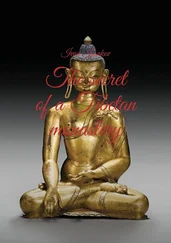With knitted brows the latter stared away from him in concentration but did not speak.
“Get up, Pandion,” said the old man at last. “I’ve been expecting this for a long time. You are no longer a boy and I can’t detain you even though I should like to. You’re free to go wherever you will, but I tell you, as a son and as an apprentice, more than that, I tell you as my friend and equal, that your wish is fatal. It promises you nothing but dire catastrophe.”
“Father, I fear nothing!” Pandion threw back his head, his nostrils dilated.
“Then I was mistaken — you are still a boy,” objected Agenor in calm tones. “Listen to me with an open heart if you really love me.”
Agenor began to tell Pandion his story in a loud, tense voice: “In the eastern cities the old customs are still observed and there are many ancient works of art there. Women dress today as they did a thousand years ago in Crete — in long stiff skirts extremely richly ornamented, with bared breasts and the shoulders and back covered. The men wear short, sleeveless tunics, have long hair and are armed with short bronze swords.
“The city of Tirinthus is surrounded by a gigantic wall fifty cubits in height. The wall is built of huge blocks of dressed stone decorated with bronze and gold ornaments that reflect the sunlight so that from a distance they look like fires dotting the wall.
“Mycenae is still more magnificent. The city is built on the summit of a high hill, gateways made of huge blocks of stone are closed with bronze grilles. The city’s buildings can be seen from a great distance on the surrounding plain.
“Although the colours of the frescoes are still bright and fresh in the palaces of Mycenae, Tirinthus and Orchomenus, although the chariots of the rich landowners still race along smooth roads paved with huge white stones as they did in former times, the grass of oblivion is gaining headway on the roads, in the courtyards of the empty houses and even on the sides of the mighty walls.”
Gone were the days of great wealth, Agenor told his pupil, the days of long journeys to fabulous Aigyptos. (Aigyptos — the Greek name from which the modern word Egypt is derived. It is a Greek distortion of the Egyptian Het-Ka-Ptah, the Palace of the Spirit of Ptah, another name for Memphis, the City of the White Walls.) The environs of these cities were now inhabited by strong phratries with large numbers of warriors. Their chiefs had subordinated very large territories, had made the cities part of their domains, had subjugated the weaker clans and declared themselves the rulers of the lands and the peoples.
In Oeniadae, where they lived, there were no mighty chiefs, just as there were no cities and beautiful temples. But then, in the east there were more slaves, more men and women who had lost their liberty. Amongst them, apart from the captives seized in foreign lands, were members of poorer clans, the fellow-countrymen of their masters. What then would be the fate of a stranger in these lands? If he was not backed by a powerful phratry with whom it was dangerous for even a strong chief to quarrel or if he were not accompanied by a strong armed escort of his own, there were only two ways open to him — slavery or death.
“Remember, Pandion,” the artist took the youth by both hands, “we live in a troubled and dangerous time — clans and phratries are at enmity with each other, there are no common laws and the threat of slavery hangs over the head of all travellers. This beautiful country is no place to travel in. Remember that if you leave us you will be without hearth or rights, anybody can humiliate or kill you without fear of invoking a blood feud or paying blood money. You’re alone and poor, I can’t help you in any way, you can’t gather even a small band of fighting men! Alone you must surely perish unless the gods make you invisible! You see, Pandion, although it seems the simplest thing in the world to you to sail a thousand stadia across the bay from our Cape Achelous to Corinth whence it is but a half day’s journey to Mycenae, a day’s to Tirinthus and three days to Orchomenus, in reality it would be the same to you as a journey beyond the bounds of Oicumene!” Agenor got up and went to the door, drawing the boy with him. “You’re like a son to me and my wife, but I’m not thinking of us… Try to imagine the sufferings of my Thessa if you were to languish in slavery in some foreign land!…”
Pandion flushed a deep red but did not answer.
Agenor felt that he had not convinced Pandion and that the youth was floundering in a sea of indecision between two strong affections, one that chained him to the house and the other that beckoned him from afar, despite the certainty of danger.
Thessa did not know what to do for the best — first she would oppose the journey and then, with noble pride, would tell Pandion to go.
Several months passed, and when the winds of spring blowing across the Gulf of Corinth, brought with them the faint aroma of the flowering hills and mountains of Peloponnesus, Pandion at last chose his life’s road.
He was determined to enter into single combat with a strange and distant world. The half year that he intended to spend in foreign parts seemed like an eternity to him. At times Pandion was dismayed by the thought that he was leaving his native shores for ever… Agenor and other wise men of their clan advised Pandion to go to Crete, the home of the descendants of the Sea People, the home of an ancient civilization. Although the huge island was much farther than the ancient cities of Boeotia and Argolis, the journey would be safer for a single traveller.
The island lay at the junction of several sea routes and was now inhabited by different tribes. Foreigners — merchants, sailors and porters — were constantly to be met on its shores. The multilingual population of Crete engaged in commerce and were more peaceful than the inhabitants of Hellas and, in general, were kinder to strangers. In the interior of the island, behind the mountain barriers, however, there still lived the descendants of ancient tribes who were hostile to all strangers.
Pandion was to cross the Gulf of Calydon to a sharp promontory opposite Lower Achaia where he would hire himself out as a rower on one of the boats carrying wool to Crete after the period of winter storms during which the frail boats of the Greeks avoided long journeys.
On the night of the full moon the youth of the district gathered for dances on the big glade of the sacred grove.
In the little courtyard of Agenor’s house Pandion sat in deepest thought, oppressed by his sorrow. The inevitable must come on the morrow, he must thrust out of his heart everything that was near and dear to him and face an unknown destiny. He must part with his beloved and an uncertain future and loneliness awaited him.
Thessa’s clothing rustled inside the silent house, then she appeared in the dark opening of the doorway, adjusting the folds of a mantle thrown over her shoulders. The girl called softly to Pandion’ who immediately jumped up and went to meet her. Thessa’s hair was folded into a heavy knot on the nape of her neck and three ribbons crossed the top of her head, coming together under the knot.
“You’ve done your hair like an Attic girl today,” exclaimed Pandion. “It’s very pretty.”
Thessa smiled and asked him somewhat sadly:
“Aren’t you going to dance for the last time, Pandion?”
“Do you want to go?”
“Yes,” answered Thessa firmly, “I’m going to dance for Aphrodite and also the crane dance.”
“You’re going to dance the Attic crane dance, so that’s why your hair is done that way! I don’t think we’ve ever danced the crane dance before.”
“Today everything is for you, Pandion!”
Читать дальше












